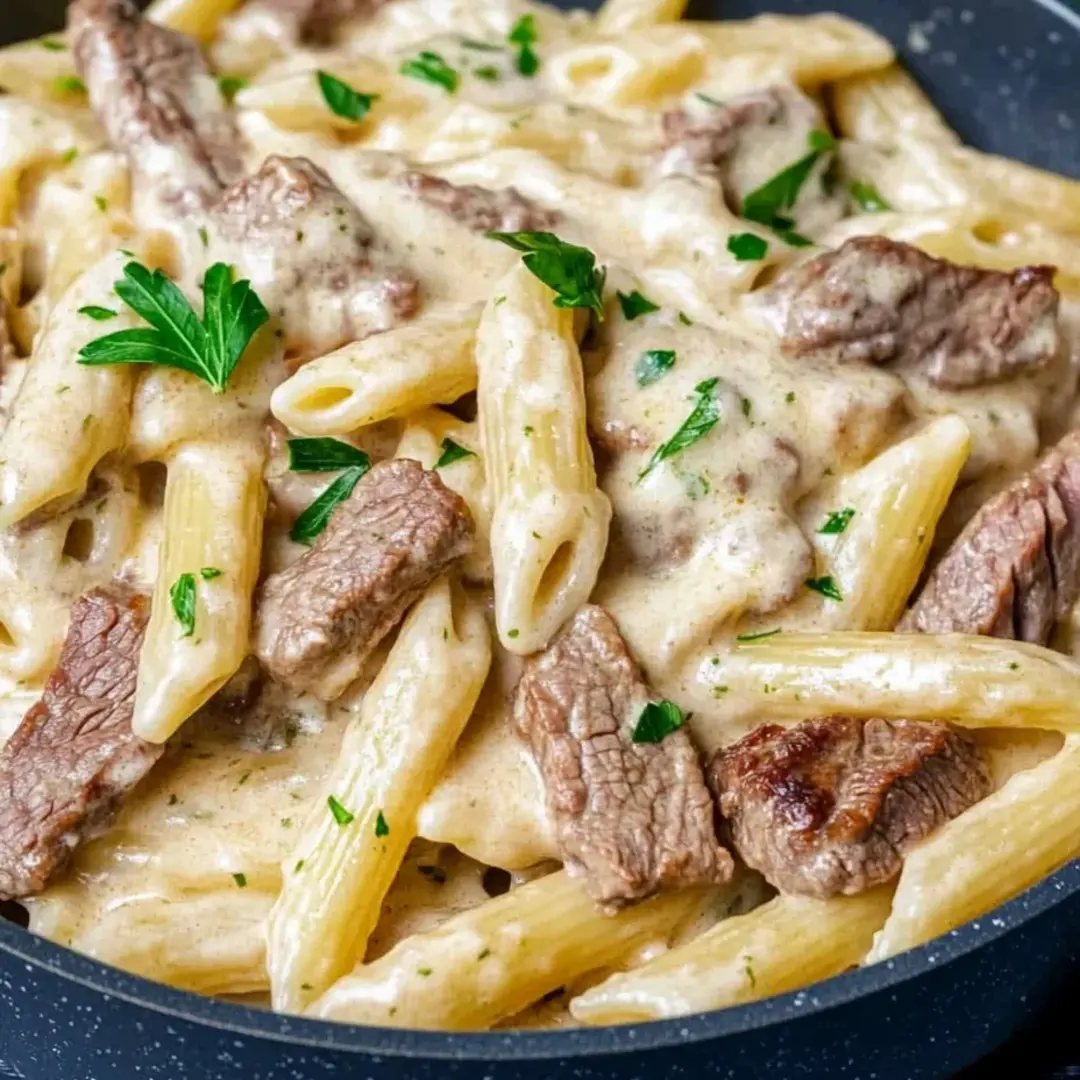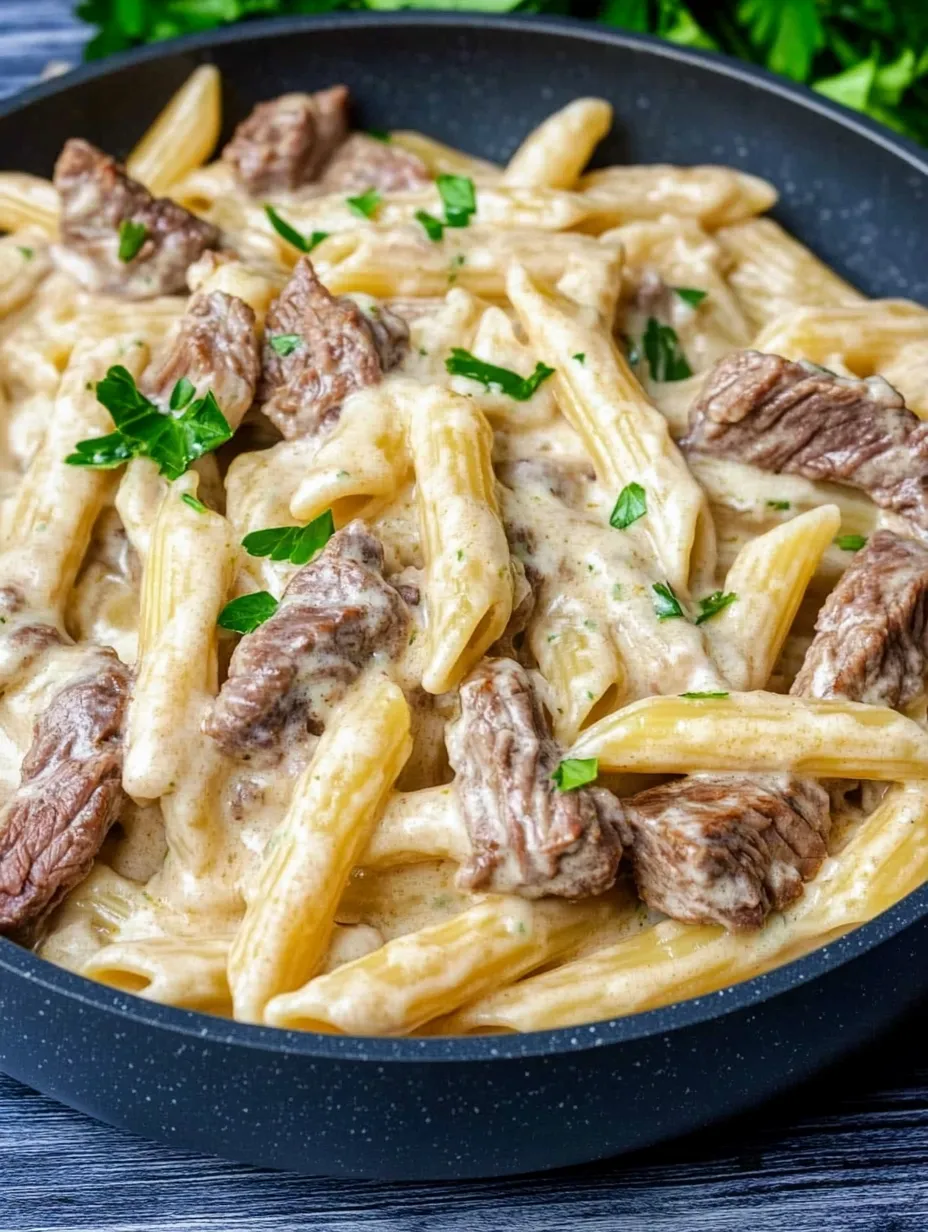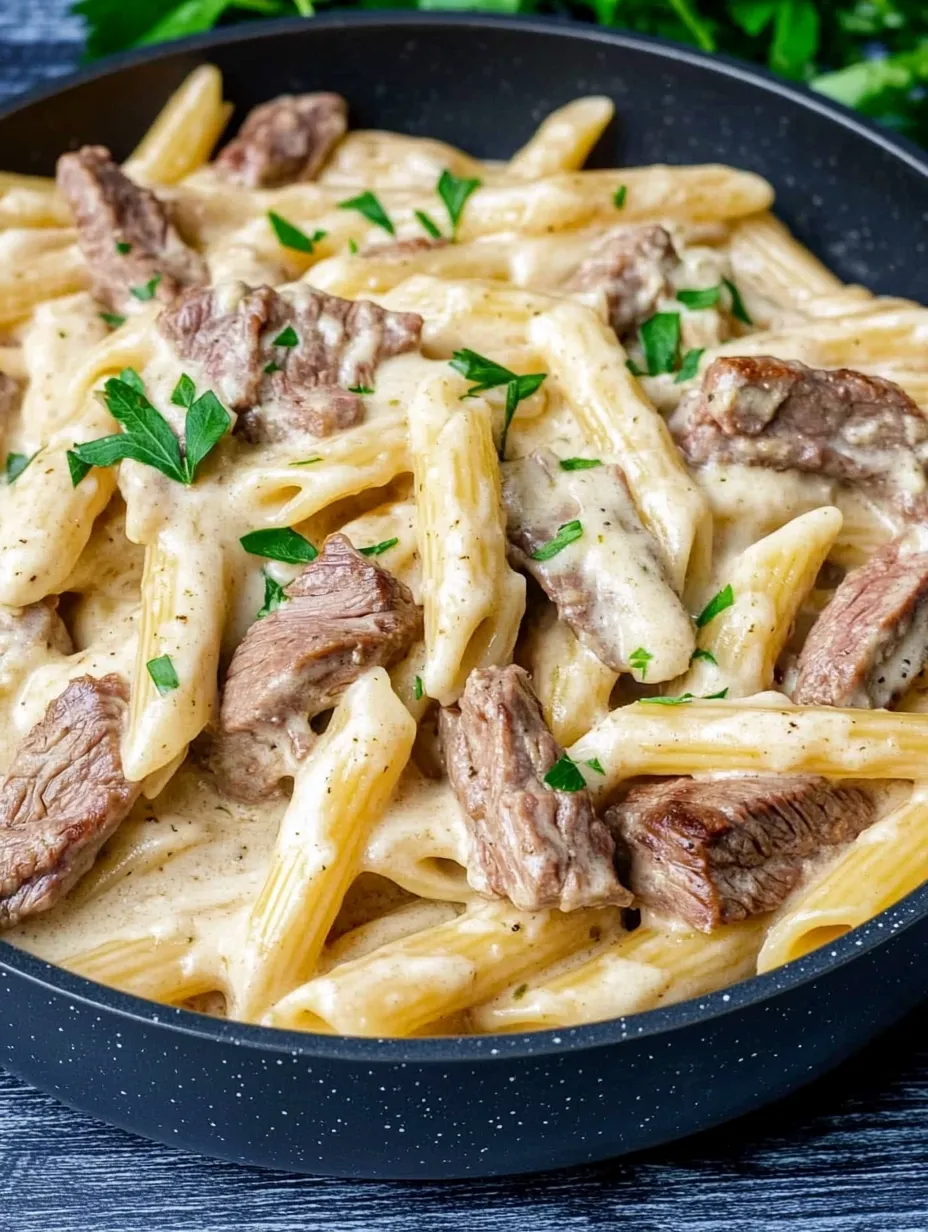 Pin it
Pin it
This luxurious Creamy Steak Pasta combines tender, juicy slices of perfectly seared steak with al dente pasta, all enveloped in a rich, velvety Parmesan sauce. The contrast between the savory, caramelized exterior of the steak and the silky, garlicky cream sauce creates an irresistible combination that elevates this dish far beyond ordinary pasta. Fresh herbs and plenty of real Parmesan cheese add depth and complexity, making this a restaurant-quality meal you can easily recreate at home. Whether you're cooking for a special occasion or simply treating yourself after a long day, this comforting yet sophisticated dish delivers maximum flavor with minimal effort.
I first made this recipe on a rainy Sunday evening when I was craving something indulgent but didn't want to leave the house. After the first bite, my husband looked up and said, "This is better than what we had at that Italian restaurant last weekend!" Now it's our go-to dish when we want to impress guests without spending all day in the kitchen. The beauty of this pasta is that it feels special enough for company but is simple enough for a weeknight dinner when you need a little extra comfort on your plate.
Key Ingredients
- Rump steak: This cut offers the perfect balance of tenderness and flavor without breaking the bank; its marbling ensures juicy results every time
- Butter: Creates the foundation for a rich sauce and helps give the steak a beautiful, caramelized crust; use unsalted so you can control the seasoning
- Fresh garlic: Provides aromatic depth to both the steak and sauce; mincing it fresh rather than using pre-prepared garlic makes a noticeable difference
- Rosemary: This woody herb infuses the butter as you baste the steak, adding an earthy, aromatic quality that complements beef beautifully
- Pasta: Short, ridged varieties like penne or rigatoni catch and hold the creamy sauce in their grooves and hollow centers
- Italian seasoning: This herb blend adds complexity without requiring a cabinet full of individual dried herbs
- Heavy cream: Creates the luxuriously silky texture that defines this sauce; its high fat content prevents curdling when mixed with the other ingredients
- Parmesan cheese: Adds savory depth and helps thicken the sauce; always grate it fresh for the best melting properties and flavor
- Pasta water: This starchy liquid helps bind the sauce to the pasta and adjust the consistency to perfection
 Pin it
Pin it
Detailed Cooking Instructions
- Step 1:
- Begin by bringing a large pot of water to a boil for your pasta. Add a generous amount of salt – about 1 tablespoon per 4 quarts of water. This is your opportunity to season the pasta itself, not just the sauce. While the water heats, continue with the steak preparation.
- Step 2:
- Take your rump steaks (approximately 1 pound total) out of the refrigerator at least 15 minutes before cooking. This allows them to come to room temperature, which promotes even cooking. Pat them completely dry with paper towels to ensure a perfect sear. Moisture is the enemy of browning, so don't skip this step.
- Step 3:
- Season both sides of the steaks generously with salt and freshly ground black pepper. The seasoning should form a visible layer on the meat. Remember that some of this seasoning will remain in the pan, so be liberal in your application.
- Step 4:
- Heat 2 tablespoons of olive oil in a large, heavy-bottomed skillet over high heat until it's shimmering but not smoking. Carefully place the steaks in the hot pan, allowing space between them. If your pan isn't large enough, cook them one at a time rather than crowding the pan, which would cause them to steam rather than sear.
- Step 5:
- Cook the steaks for 3-4 minutes on the first side without moving them. This allows a beautiful brown crust to develop. Flip only once and cook for an additional 3-4 minutes on the second side for medium-rare, or adjust the time to your preferred doneness.
- Step 6:
- Add 3 tablespoons of butter, 2-3 cloves of minced garlic, and a sprig of fresh rosemary to the pan. As the butter melts, tilt the pan slightly and use a spoon to baste the steaks continuously with the aromatic butter for about 1 minute. This technique, called arroser, infuses the steak with flavor while contributing to even cooking.
- Step 7:
- Remove the steaks from the pan and place them on a cutting board. Tent loosely with foil and allow them to rest for at least 5 minutes. This critical step allows the juices to redistribute throughout the meat instead of flowing out when cut, resulting in a juicier steak.
- Step 8:
- While the steaks are resting, cook 12 ounces of pasta in the boiling salted water according to package directions until al dente, typically 8-10 minutes. Before draining, reserve about 1½ cups of the pasta cooking water. This starchy liquid is essential for creating a silky sauce that clings to the pasta.
- Step 9:
- Return the same skillet used for the steaks to medium heat. Add 2 more tablespoons of butter and allow it to melt. Add 3-4 cloves of minced garlic and cook for approximately 1 minute until fragrant but not browned. Garlic becomes bitter when overcooked, so watch it carefully.
- Step 10:
- Stir in 1 teaspoon of Italian seasoning, crushing it between your fingers as you add it to release more flavor. Pour in ½ cup of chicken stock and use a wooden spoon to scrape up any browned bits from the bottom of the pan. These caramelized pieces, known as fond, contain concentrated flavor that will enrich your sauce.
- Step 11:
- Allow the stock to simmer for 1-2 minutes until slightly reduced, then pour in 1 cup of heavy cream. Bring to a gentle simmer and cook for 3-4 minutes until the sauce begins to thicken slightly. Avoid boiling the cream, which can cause it to break.
- Step 12:
- Slice the rested steaks against the grain into thin strips, about ¼-inch thick. Cutting against the grain shortens the muscle fibers, resulting in more tender bites. Add the sliced steak and any accumulated juices from the cutting board back to the pan.
- Step 13:
- Add the drained pasta directly to the sauce in the skillet. Sprinkle in ¾ cup of freshly grated Parmesan cheese and toss everything together. If the sauce seems too thick, add the reserved pasta water, a few tablespoons at a time, until you reach your desired consistency. The starchy water helps the sauce cling to the pasta instead of pooling at the bottom of the plate.
- Step 14:
- Finish the dish with 2 tablespoons of freshly chopped parsley, which adds color and a fresh flavor contrast. Taste and adjust the seasoning with additional salt and freshly ground black pepper as needed.
- Step 15:
- Serve immediately in warmed bowls, with extra Parmesan cheese for sprinkling at the table. The heat of the bowl helps keep the sauce creamy longer as you enjoy each bite.
The Perfect Sear: Secrets to Juicy Steak
The key to elevating this pasta dish lies in properly cooking the steak. Having tested countless methods, I've found that starting with room temperature meat makes an enormous difference in how evenly it cooks. Beyond that, ensuring your pan is properly heated before adding the steak is crucial. The pan should be hot enough that the steak sizzles immediately upon contact but not so hot that the oil smokes excessively. I've discovered that cast iron provides the most consistent results, as it retains heat beautifully and creates that restaurant-quality crust we all crave. Don't be tempted to move the steak during the initial searing phase – those gorgeous caramelized edges form when the proteins remain in constant contact with the hot surface. Finally, the butter-basting technique borrowed from professional chefs adds incredible flavor while promoting even cooking.
 Pin it
Pin it
Making the Creamiest Sauce
After years of making cream-based pasta sauces, I've learned that patience is essential for achieving the perfect consistency. Allow the cream to reduce slowly over medium-low heat rather than rushing it at high heat, which can cause separation. The reserved pasta water is your secret weapon for creating a silky sauce that perfectly coats each piece of pasta. The starch in this water acts as a natural emulsifier, helping the fat in the cream and cheese blend seamlessly with the other ingredients. Adding the Parmesan gradually rather than all at once also helps prevent clumping. For the smoothest result, make sure your cheese is at room temperature and finely grated – the pre-shredded varieties often contain anti-caking agents that can make your sauce grainy.
Customizing Your Creamy Steak Pasta
One of the things I love most about this recipe is its versatility. On days when I'm craving extra vegetables, I often add sautéed mushrooms, which complement the steak beautifully with their earthy flavor. Simply cook 8 ounces of sliced mushrooms in a separate pan until golden, then fold them in with the pasta. For a bit of color and sweetness, roasted cherry tomatoes or red bell peppers make wonderful additions. If you enjoy a touch of heat, a pinch of red pepper flakes added to the garlic as it sautés will infuse the entire dish with a pleasant warmth. For special occasions, a splash of good quality dry white wine (about ¼ cup) reduced before adding the cream adds wonderful complexity to the sauce.
I discovered by happy accident that adding a teaspoon of Dijon mustard to the cream sauce creates an incredible depth of flavor that complements the steak beautifully. It was a desperate substitution one night when I realized I was out of Italian seasoning, but now it's become my "secret ingredient" that makes guests ask what makes the sauce so special!
This Creamy Steak Pasta has become my go-to recipe when I want to impress without stress. There's something magical about the combination of tender steak and silky pasta that satisfies on a level beyond ordinary comfort food. What began as a simple way to use up leftover steak has evolved into a dish I proudly serve at dinner parties, where the empty plates and requests for seconds tell me everything I need to know. In a world of complicated recipes with lengthy ingredient lists, this straightforward yet decadent pasta reminds us that sometimes the most memorable meals come from simple ingredients prepared with care.
Frequently Asked Questions
- → What cut of steak works best for this pasta?
- Rump steak is specified in the recipe, but you could also use sirloin, ribeye, or strip steak. The key is to use a tender cut that cooks quickly and can be sliced thinly.
- → What type of pasta should I use?
- Medium-shaped pasta works best to hold the creamy sauce. Penne, fusilli, farfalle (bow ties), or rigatoni are all excellent choices. You could also use fettuccine or linguine if you prefer long pasta.
- → Can I make this dish without heavy cream?
- Yes, you can substitute half-and-half for a lighter version, though the sauce won't be quite as rich. For a dairy-free option, try full-fat coconut milk, which will add a slight coconut flavor.
- → How do I know when my steak is cooked to my preferred doneness?
- For medium-rare, cook until the internal temperature reaches 135°F (57°C). For medium, aim for 145°F (63°C), and for well-done, 160°F (71°C). Using a meat thermometer is the most accurate method.
- → Can I make this dish ahead of time?
- This pasta is best enjoyed fresh, as reheating may overcook the steak. If needed, you can prepare the components separately: cook the steak, make the sauce, and cook the pasta. Reheat the sauce gently, toss with pasta, and add the sliced steak just before serving.
